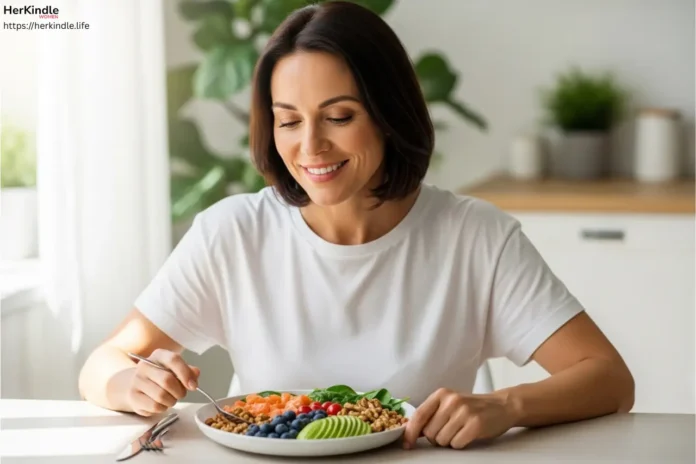Inflammation. It’s a word you’ve probably heard your doctor mention, especially if you’ve been dealing with fatigue, weight gain, or joint pain. But what if I told you there’s a way to take control of your health—and your family’s—starting from your very next meal?
In this guide, we’ll explore the anti-inflammatory diet, a science-backed approach to eating that helps reduce chronic inflammation, boost energy, and support long-term wellness—especially for women juggling work, family, and life’s endless responsibilities.
Whether you’re already on a health journey or just beginning to question what’s on your plate, this guide will serve as both an educational tool and an empowering roadmap. Let’s dig in.
What Is Chronic Inflammation?
Chronic inflammation is your immune system stuck in overdrive. Unlike acute inflammation, which is a natural response to injury or infection, chronic inflammation lingers silently in the background, damaging healthy cells and tissues over time.
The Hidden Risks of Chronic Inflammation
According to recent research, chronic inflammation is linked to:
- Heart disease
- Type 2 diabetes
- Autoimmune disorders
- Obesity
- Mood disorders like depression and anxiety
What’s more alarming is that many of us are living with low-grade inflammation without even realizing it—fatigue, brain fog, stubborn weight, and hormonal imbalances could all be symptoms.
The Anti-Inflammatory Diet: A Healing Solution
The anti-inflammatory diet is not a fad or quick-fix cleanse. It’s a sustainable, evidence-based approach to eating that nourishes your body, reduces inflammatory responses, and prevents disease over the long term.
Rather than focusing on restriction, this way of eating encourages whole, nutrient-dense, colorful foods that support your immune system and gut health.
Anti-Inflammatory Foods to Focus On
Eating for healing begins with what you add, not just what you eliminate.
Here are the key anti-inflammatory foods you should embrace:
1. Fruits and Vegetables (Especially Colorful Ones)
These are rich in antioxidants, polyphenols, and fiber. Berries, spinach, kale, broccoli, red peppers, and carrots are inflammation-fighting powerhouses.
💡 Aim for at least 5–9 servings of fruits and vegetables per day.
2. Fatty Fish
Salmon, sardines, and mackerel provide omega-3 fatty acids, known for their potent anti-inflammatory effects.
3. Whole Grains
Quinoa, brown rice, oats, and buckwheat are high in fiber and phytonutrients. Avoid refined grains which can spike blood sugar.
4. Healthy Fats
Incorporate extra virgin olive oil, avocado, nuts (especially walnuts), and seeds like flax or chia.
5. Herbs and Spices
Turmeric (with black pepper), ginger, cinnamon, and garlic aren’t just flavorful—they’re medicinal.
6. Plant-Based Proteins
Legumes (lentils, beans, chickpeas), tofu, and tempeh provide fiber and phytonutrients that fight inflammation.
Foods That Trigger Inflammation (And You Should Avoid)
Just as important as adding healing foods is avoiding foods that promote inflammation:
- Processed and packaged foods: Often high in refined sugars, trans fats, and additives
- Refined carbs: White bread, pastries, and sugary cereals
- Sugary beverages: Soda, energy drinks, sweetened coffee drinks
- Red and processed meats: Bacon, sausages, and cold cuts
- Artificial sweeteners and preservatives
🚫 If your food comes with a long ingredient list you can’t pronounce—skip it.
Building Your Anti-Inflammatory Meal Plan
Let’s bring it all together into a practical anti-inflammatory meal plan tailored to busy women like you.
✨ Daily Anti-Inflammatory Template:
- Breakfast: Overnight oats with chia seeds, berries, and almond butter
- Lunch: Quinoa salad with leafy greens, chickpeas, avocado, olive oil dressing
- Snack: Hummus with sliced cucumbers and carrots
- Dinner: Baked salmon with steamed broccoli and roasted sweet potatoes
- Dessert: Dark chocolate square or fresh fruit with cinnamon
Weekly Anti-Inflammatory Meal Plan
| Day | Breakfast | Lunch | Dinner |
|---|---|---|---|
| Monday | Green smoothie + seeds | Lentil soup | Grilled salmon + quinoa |
| Tuesday | Avocado toast + egg | Chickpea bowl | Stir-fry tofu + brown rice |
| Wednesday | Oatmeal with berries | Kale salad with nuts | Baked chicken + veggies |
| Thursday | Greek yogurt + flax | Turkey lettuce wraps | Veggie curry + basmati rice |
| Friday | Smoothie bowl | Black bean tacos | Grilled shrimp + asparagus |
| Saturday | Chia pudding + fruit | Roasted veggie sandwich | Zucchini noodles + pesto |
| Sunday | Scrambled tofu + greens | Tomato soup + avocado | Wild rice bowl + miso tofu |
✅ Prep ahead, batch cook, and freeze when possible to make life easier!
Key Lifestyle Tips That Enhance Anti-Inflammatory Effects

Diet is only one piece of the puzzle. Combine it with lifestyle changes to maximize your results:
✔️ Prioritize Sleep
Aim for 7–9 hours per night. Lack of sleep raises cortisol levels and inflammation.
✔️ Manage Stress
Meditation, walking in nature, journaling, or talking to a friend all help regulate inflammatory responses.
✔️ Gentle Movement
Regular walking, yoga, or swimming can help reduce joint stiffness and inflammation.
✔️ Stay Hydrated
Drink at least 8–10 cups of water per day. Dehydration can make inflammation worse.
Frequently Asked Questions (FAQ)
Start by removing inflammatory foods like processed sugar and incorporating more whole, plant-based meals. Turmeric and omega-3s can help reduce inflammation within days.
Yes. Many people with rheumatoid arthritis, Hashimoto’s, and other autoimmune conditions experience symptom relief on this diet.
Absolutely! It provides essential nutrients for mom and baby. However, consult your healthcare provider for personalized advice.
Most people report feeling more energetic and less bloated within 1–2 weeks. Long-term results vary depending on your health history and consistency.
Conclusion: A Diet That Heals and Empowers
If you’re a woman balancing career, family, and self-care, your plate matters more than ever. The anti-inflammatory diet isn’t just about fighting disease—it’s about creating energy, stability, and longevity.
It empowers you to:
- Reclaim your energy
- Heal your gut
- Support hormonal balance
- Prevent long-term health issues
It’s not about being perfect. It’s about making consistent, nourishing choices—and you don’t have to do it alone. Start today with one anti-inflammatory meal. Your body will thank you.







